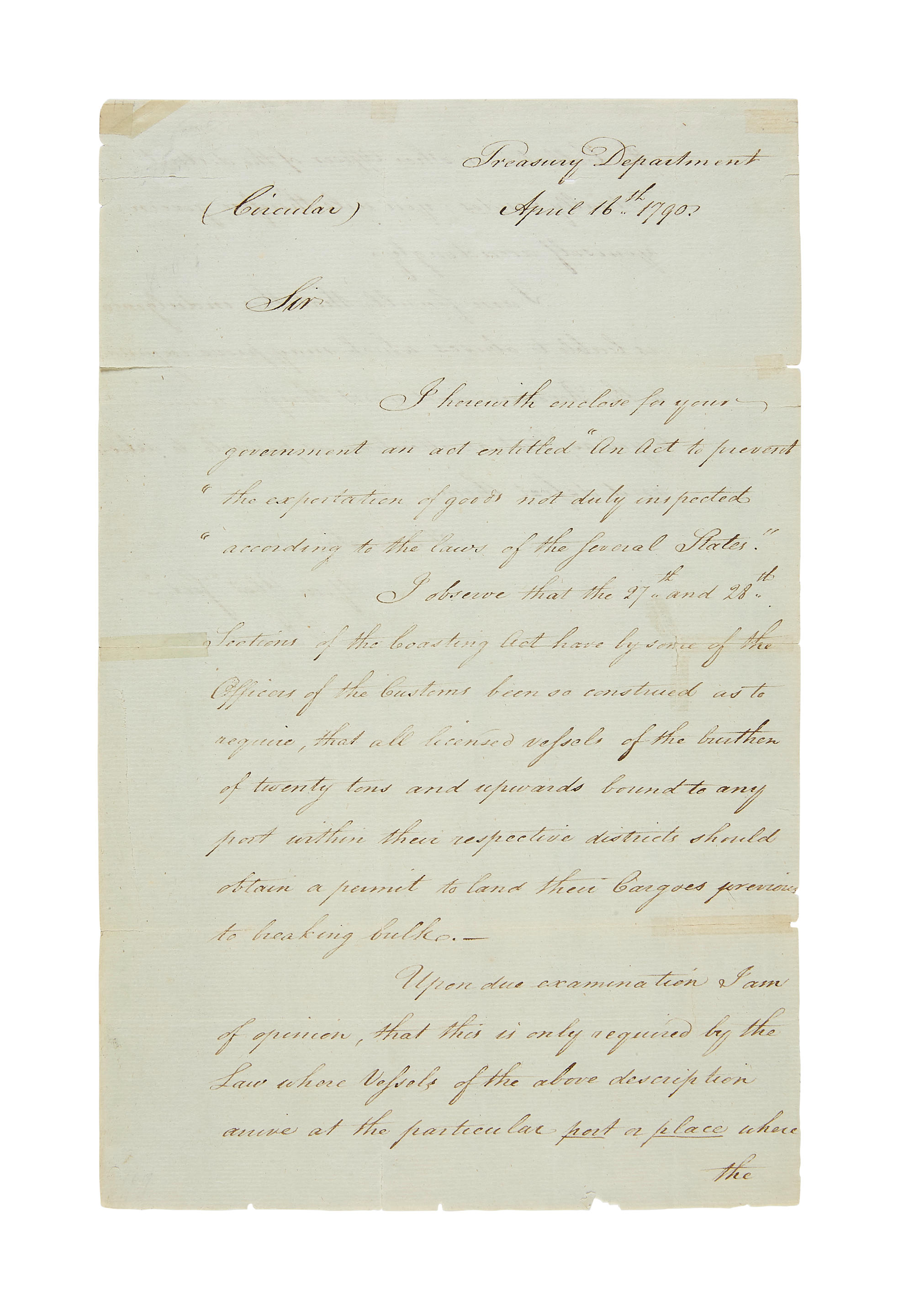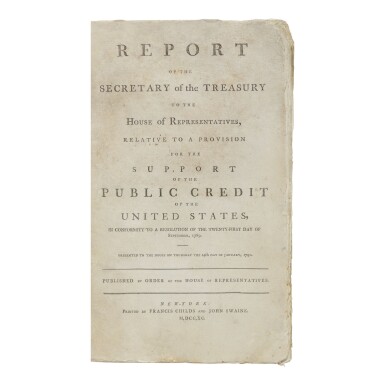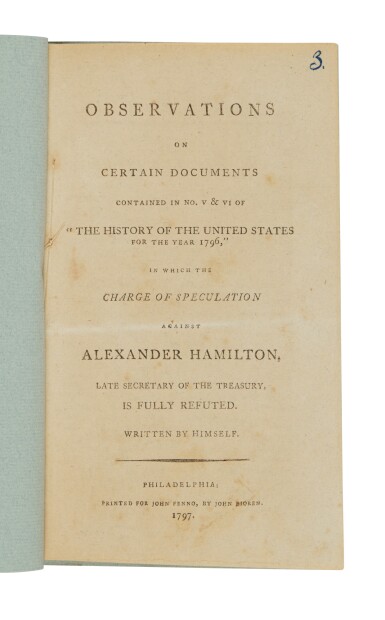HAMILTON, Alexander (1755-1804), First Secretary of the Treasury . Letter signed ("A Hamilton Secy of the Treas y") as First Secretary of the Treasury, to an unidentified correspondent (a Collector of Massachusetts), Treasury Department, [New York, N.Y.], 20 November 1789. 2 full pages, 4to , Fine. ENCOURAGING THE FLOW OF SPECIE AND CURRENCY, TWO MONTHS AFTER HAMILTON BECOMES FIRST SECRETARY OF THE TREASURY UNDER THE NEW CONSTITUTION An interesting circular letter in a very ornate cursive hand, written only two months after Hamilton took control of the newly constituted Treasury Department, and reflecting one of his foremost objectives, to increase the supply of specie in circulation to encourage trade, investment and commerce. Here, he allows collectors to take note instead of specie in payment of duties: "I have heretofore directed you to receive in payment of the Duties the Notes [bank-notes] of the Banks of North America and New York. I now desire that you will also receive those of the Bank of Boston, and will exchange whatever Specie you may at any time have in your hands for these Notes." To protect against counterfeit bank-notes, he goes on, "I shall request the Directors of that Bank to send you the signatures of the President and cashierwith a Description of the marks of their Notes." He gives further directions regarding the exchange of notes for specie and directs that a copy of each receipt should be sent to him: "These receipts will discharge you at the Treasury for whatever Sums you shall remit." The Collector is further instructed to remit any funds in excess of $100 "above what may be requisite for current expences." These procedures, Hamilton explains "are intended to enable me to avail the public of the Revenues arising in your State, without drawing the Specie out of it, by facilitating the Negotiation of Drafts, for which there is rarely any demand except upon Boston." The measures are to remain in effect until countermanded by Hamilton or by "Benjamin Lincoln, Collector of the Port of Boston." Because the Federal government's chief source of revenue was custom collections, Hamilton took every possible step to maintain the flow of these funds, and to encourage the free flow of depository funds, as demonstrated in the present letter (partially quoted in R. Hendrickson, Hamilton, 2, p.14).
HAMILTON, Alexander (1755-1804), First Secretary of the Treasury . Letter signed ("A Hamilton Secy of the Treas y") as First Secretary of the Treasury, to an unidentified correspondent (a Collector of Massachusetts), Treasury Department, [New York, N.Y.], 20 November 1789. 2 full pages, 4to , Fine. ENCOURAGING THE FLOW OF SPECIE AND CURRENCY, TWO MONTHS AFTER HAMILTON BECOMES FIRST SECRETARY OF THE TREASURY UNDER THE NEW CONSTITUTION An interesting circular letter in a very ornate cursive hand, written only two months after Hamilton took control of the newly constituted Treasury Department, and reflecting one of his foremost objectives, to increase the supply of specie in circulation to encourage trade, investment and commerce. Here, he allows collectors to take note instead of specie in payment of duties: "I have heretofore directed you to receive in payment of the Duties the Notes [bank-notes] of the Banks of North America and New York. I now desire that you will also receive those of the Bank of Boston, and will exchange whatever Specie you may at any time have in your hands for these Notes." To protect against counterfeit bank-notes, he goes on, "I shall request the Directors of that Bank to send you the signatures of the President and cashierwith a Description of the marks of their Notes." He gives further directions regarding the exchange of notes for specie and directs that a copy of each receipt should be sent to him: "These receipts will discharge you at the Treasury for whatever Sums you shall remit." The Collector is further instructed to remit any funds in excess of $100 "above what may be requisite for current expences." These procedures, Hamilton explains "are intended to enable me to avail the public of the Revenues arising in your State, without drawing the Specie out of it, by facilitating the Negotiation of Drafts, for which there is rarely any demand except upon Boston." The measures are to remain in effect until countermanded by Hamilton or by "Benjamin Lincoln, Collector of the Port of Boston." Because the Federal government's chief source of revenue was custom collections, Hamilton took every possible step to maintain the flow of these funds, and to encourage the free flow of depository funds, as demonstrated in the present letter (partially quoted in R. Hendrickson, Hamilton, 2, p.14).













Testen Sie LotSearch und seine Premium-Features 7 Tage - ohne Kosten!
Lassen Sie sich automatisch über neue Objekte in kommenden Auktionen benachrichtigen.
Suchauftrag anlegen